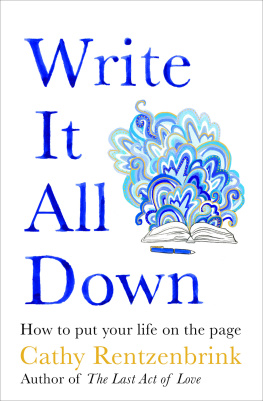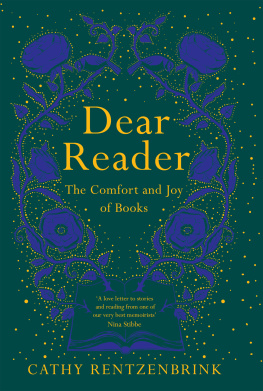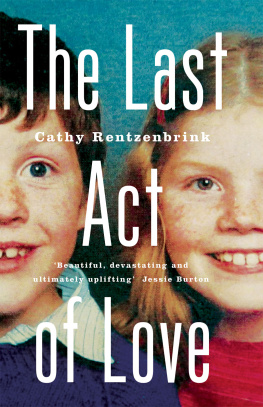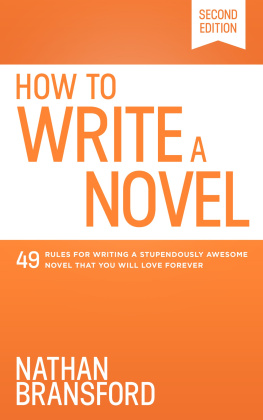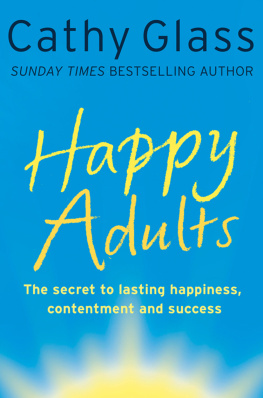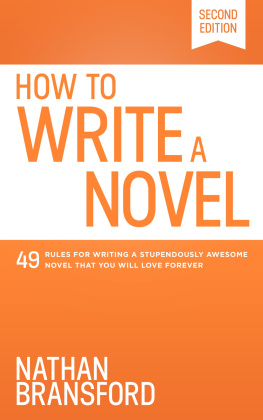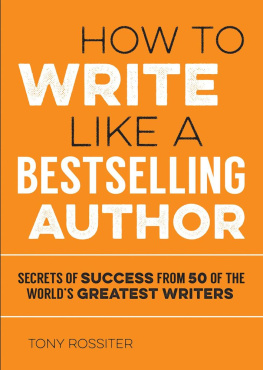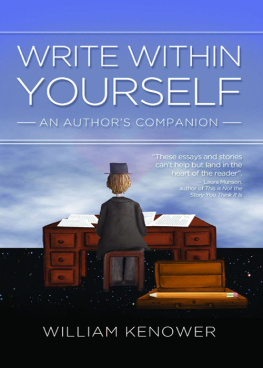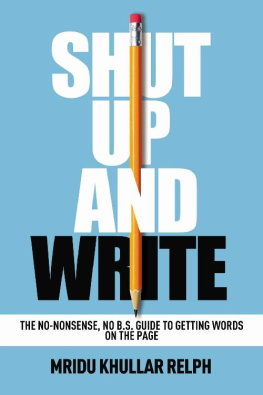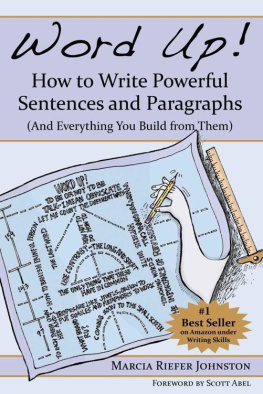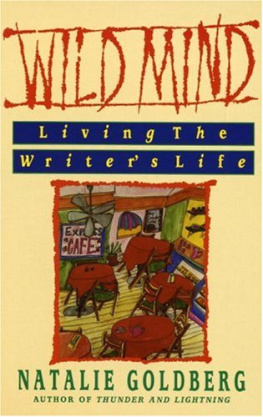About the Author
Cathy Rentzenbrink is the author of The Last Act of Love, A Manual for Heartache, Dear Reader and Everyone Is Still Alive. She lives in Cornwall with her family.
Acknowledgements
In 2018 I was stuck with my novel and wondered if I might be happier if I trained as a therapist. I knew that a publisher I had long admired, Carole Tonkinson, had done this so I asked for advice. Over coffee, Carole encouraged me to talk and then eventually and very kindly said she thought I could make the helpful contribution I yearned for by just carrying on teaching writing. And that I would manage to get unstuck with my novel. And that at some point in the future I might want to write about writing. And all those things came to pass and I am extremely grateful to Carole for everything from having the idea, to enabling such a pleasurable process, to making this book into the beautiful object it is. Im also indebted to Hockley Raven Spare, Zainab Dawood, Katie Dent, Claire Gatzen, Kate Berens and everyone at Bluebird, including Mel Four for the gorgeous cover and illustrations, Jodie Mullish, Sian Gardiner, Jess Duffy, Emma Finnigan, Christian Lewis, Sarah Badhan and Lindsay Nash. There are too many to name individually in the wider team at Pan Macmillan, but thanks to everyone working in communications, contracts, distribution, operations, production, sales and beyond who helped to transform this book from an idea into something that might inspire a reader to become a writer themselves.
Much of what I know about writing and editing was learnt at the knee of Francesca Main who edited my first four books and from my agent Jo Unwin who has been with me from the beginning. All my thanks and love go to them, and, as they say, any mistakes are mine alone.
Writing can be a lonely old business, and part of what I enjoy about teaching is the feeling of having colleagues. Im grateful to Helen Mellor and all at Arvon, Anna Davis and all at Curtis Brown Creative, and Spread the Word, New Writing Norwich, New Writing North, Falmouth University and everyone else who has given me stimulating employment. Huge thanks also to my co-tutors and collaborators; Colin Grant, Marina Benjamin, Kit de Waal, Nina Stibbe, Kate Dimbleby, Wyl Menmuir, Julia Samuel, Claire de Boursac, and Janine Giovanni. An especial wave to everyone who has contributed to the inspiring addendum: Dolly Alderton, Sam Baker, Meg-John Barker, Xanthi Barker, Damian Barr, Marina Benjamin, Daisy Buchanan, Catherine Cho, Elizabeth Day, Colin Grant, Viv Groskop, Matt Haig, Sali Hughes, Adam Kay, Marianne Levy, Lucy Mangan, Alex Marzano-Lesnevich, Kate Mosse, Maggie OFarrell, Musa Okwonga, Marianne Power, Rhik Samadder, Julia Samuel, Philippe Sands, Sathnam Sanghera, Lemn Sissay, Nikesh Shukla, Nina Stibbe, Clover Stroud, Kit de Waal, Terry Waite, Christie Watson, David Whitehouse, Candice Carty-Williams, Raynor Winn and Greg Wise.
As soon as I started teaching, my students told me I should write it all down and I am so grateful for all that encouragement. Truly, the very thought of you all lights me up. A special mention to Esther Connor for being my first client and to everyone present when I recorded sessions at Kelso and Kestle Barton. It has been a joy to hear your voices again.
Big love and thanks also to Sanja Oakley, Roberta Boyce, Mia Kowada, Kristin Ecklund, Jo Dawson, Sophie Kirkham, John and Lizzie Waterhouse, Sarah Wade, Crystal Mahey-Morgan, Inbal Brickner-Braun, Ros Try-Hane, Kat Brown, Jenny Knight and Julie Noble.
On the home front, my parents, Kevin and Miggy Mintern, continue to support and look after me in multitudinous ways, as does my Aunt, Marion Bowyer. Im grateful to Grace Alexander for vastly improving everything, and to Will Lewis and Sophie Seamark for helping me get some work done. And a final word to Erwyn and Matt for sharing the joys and pains of everyday life with me, and for allowing me to put them in books. Matt thinks I should dedicate this book to our pets. I have refused, but have agreed to mention them here. Reepicheep, Arabella and Stitch: Thanks for all the emotional support. I couldnt have done it without you.
Further Reading
Probably the single best thing you can do for your writing, after making the time to do it, is to read. It will be no surprise to you by now, dear writer, that I would strongly urge you to spend fewer of your precious minutes on social media and news, and more on engaging with long-form narrative. Come, wander with me among my bookcases...
The writing shelf
Ive been reading some of these for decades, and every time I go back I discover something that I didnt notice until I was ready for it. What all these books have in common is that they feel well-intentioned, like their author is getting a genuine kick out of sharing their process and really wants us to succeed. They are all heavy on inspiration and light on rules.
Becoming a Writer by Dorothea Brande
Published in 1934, this slim and practical volume advocates writing first thing to access the richness of the unconscious: Throughout your writing life, whenever you are in danger of the spiritual drought that comes to the most facile of writers from time to time, put the pencil and paper back on your bedside table, and wake to write in the morning.
The Artists Way by Julia Cameron
This course for creativity recovery that you can do over twelve weeks is full of inspiration and wisdom, and I love the way Cameron weaves in exercises and anecdotes. I know some newly sober women who have formed a group to do it together, which makes my heart feel glad. Elizabeth Gilbert says she has done it three times and credits it for Eat Pray Love.
Big Magic by Elizabeth Gilbert
A refreshing and liberating manifesto which urges us to let ourselves off various hooks: Do whatever brings you to life, then. Follow your own fascinations, obsessions, and compulsions. Trust them. Create whatever causes a revolution in your heart. The rest of it will take care of itself.
Writing Down the Bones by Natalie Goldberg
Published in 1986, this generous book has boatloads of practical tips and encouraging wisdom on every page: Life is so rich, if you can write down the real details of the way things were and are, you hardly need anything else.
On Writing by Stephen King
Short and robust, this has some nice memoir writing in it and is full of gems: Stopping a piece of work just because its hard, either emotionally or imaginatively, is a bad idea. Sometimes you have to go on when you dont feel like it, and sometimes youre doing good work when it feels like all youre managing is to shovel shit from a sitting position.
Bird by Bird by Anne Lamott
Almost all good writing begins with terrible first efforts. I have read this charming book so often I really feel like Anne Lamott is my friend. Her company is both invigorating and soothing, and she is great on short assignments and shitty first drafts as a way to get work done.
A Swim in a Pond in the Rain by George Saunders
I spent a recent weekend luxuriating in this book, which is about Russian short stories but contains much for the memoirist to feast upon. Saunders is a beautiful writer and thinker, and his notion of iconic space is very relevant to voice.
The rescue shelf
The following books have all helped me with the behavioural side of writing and life, and I read them in the evenings when I am staying off the internet. I have learnt that when my mood dips, it really serves me to browse my rescue shelf and remind myself of what I already know but can easily forget in the scrum of modern life.

